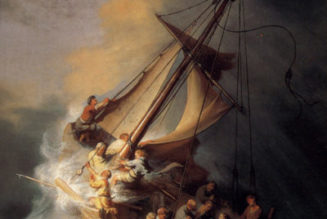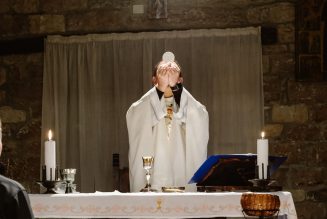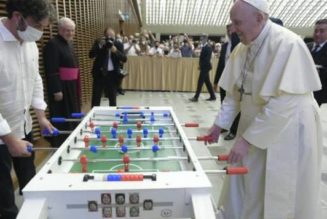
People love pretty lies, so the world needs Christians who are willing to say hard things in a convicting way. Or, to put it another way, “You are the salt of the earth.”
At the same time, people feel embattled and crushed by life, so the world needs Christians to say encouraging things about our ultimate purpose. In other words: “You are the light of the world.”
This is the paradox that has made the Gospel reading for the Fifth Sunday in Ordinary Time Year A one of the best remembered, most cited, and at the same time most mysterious passages in the Bible.
Last Sunday Jesus explained what makes you “Blessed” — this week he tells you what makes you a blessing.
As Lent approaches we are getting Christianity 101 on Sundays; the Sermon on the Mount in slow motion. After launching Jesus’s ministry with the Baptism of Jesus, the “A” Cycle in Ordinary Time takes us through the key teachings of Matthew’s Gospel, starting with the Beatitudes. Jesus told us we are “Blessed” in the Kingdom of heaven if we value God above all things; now he tells us that makes us a blessing on earth because we are “the salt of the earth” and “the light of the world” — antidotes to a world that is too often insipid, and too often dark.
We often overcomplicate Jesus’s instructions here. At least I do. There are fruitful meditations on this passage that look at the ancient world’s use of salt as a preservative and the way lanterns indicated civilization and order. But if you think of the words in their natural meanings and colloquial connotations, it’s easy to see what Jesus is saying.
We associate salt with blood, sweat, and tears; salt indicates hard work and tough times. We associate light with loving eyes and glowing hearths; light is about joy and welcome. We also call people “salty” when they are sharp-tongued, with caustic observations that serve as an irritant. And we call people “brilliant” if they help us “look on the bright side” of our circumstances.
So, to be salt is to be honest, unafraid to notice that there are deep problems in the world today. Salty types refuse to blithely accept the world’s problems; they grind into them. Christians function as salt when we “Admonish sinners,” “Counsel the doubtful” and “Instruct the ignorant” — three of the Seven Spiritual Works of Mercy. Christians from John the Baptist to Rev. Martin Luther King have gotten killed for speaking uncomfortable truths; for being the salt of the earth.
On the other hand, to be light is to be encouraging, illuminating God’s higher purpose and sharing how greatly we are loved by life’s Creator. To be a light for the world is to “Comfort the afflicted,” “Forgive offenses,” and “Bear wrongs patiently” — three more of the Spiritual Works of Mercy. Christians have shown brightly in the world, from St. Francis of Assisi celebrating creation to Fulton Sheen telling us that life is worth living.
What is remarkable is that Christians are meant to be both at the same time; irritants and encouragers, dark clouds that part for God.
Jesus has a deep psychological insight here.
Christ’s words are the the higher, purer form of a similar insight that modern psychological theorists such as Carl Jung are praised for “discovering.”
Jung’s quotable quotes sound a lot like exhortations to appreciate the salt of life.
He said people’s neuroses often stem from their expectation that life will be carefree. “Life is a battleground. It always has been, and always will be,” he says as a corrective. Sanity lies in embracing the difficulty of life. He said “Everything that irritates us about others can lead us to an understanding of ourselves,” and, “Knowing your own darkness is the best method for dealing with the darkness of other people.”
But another of Jung’s famous exhortations was all about being the light of the world.
He interviewed a Pueblo Indian leader who warned that Americans should not interfere with his tribe’s daily religious rituals. “We are the sons of the Father, the Sun,” said the tribal leader. “We must help him daily to rise over the horizon and to walk over heaven. And we don’t do it for ourselves only; we do it for America; we do it for the whole world.” The tribe was wrong about astronomy, of course, but Jung said that their conviction that the sun’s daily journey depended on them gave them a strong sense of purpose. There were no neuroses in this tribe.
Christians know that life is a battle better than Jung did, and we know our purpose is greater than moving the sun.
We know that life is a battle to the death — the death of our soul and our culture — with sin and Satan. We know that he who does not take up his cross each day is not worthy. Jesus says to embrace the battle, acknowledge it, and even savor it, because we have a high purpose.
And our purpose is greater than the sun, which is a ball of burning gasses in an obscure corner of the universe that will burn itself out one day. Our purpose is to help eternal human souls become divinized, participating in the life of the Trinity for all eternity, despite their tendency to enslave themselves to sin. The Pueblo Indians’ purpose is their relationship with the world’s sun — ours is our relationship with God’s Son. If the Pueblo Indians do their job, we get some daylight before night returns. If we do our job, we shine brighter than the sun forever.
The two definitive saints of our time, Mother Teresa and St. John Paul II, are great examples of being both salt and light.
Mother Teresa was light when she said: “Every time you smile at someone, it is an action of love, a gift to that person, a beautiful thing.”
She was salt when she said: “I feel that the greatest destroyer of peace today is abortion, because it is a war against the child, a direct killing of the innocent child, murder by the mother herself.”
John Paul II was both salt and light when he told us: “Faced with problems and disappointments, many people will try to escape from their responsibility: escape in selfishness, escape in sexual pleasure, escape in drugs, escape in violence, escape in indifference and cynical attitudes. But today, I propose to you the option of love, which is the opposite of escape.”
It is our job to do what they did for the people we know.
St. Paul gives the shortcut to being salt and light in the world: Preach Christ crucified.
He tells the Corinthians that he didn’t pretend life was rosy and the faith was untroubled joy when he came to them. “I did not come with sublimity of words or of wisdom,” he says.
Instead, he came “in weakness and fear and much trembling.” and “I resolved to know nothing while I was with you except Jesus Christ, and him crucified,” he says.
Jesus Christ crucified is both salt and light. The crucifix is an icon showing that life is a battleground — a place where our sins are so terrible that they destroyed God Incarnate. It is also an icon showing that our hope is incomprehensibly bright, because God’s love for us is so immense that he joined humanity to win our love with his life.
Truly, our faith rests “not on human wisdom but on the power of God.”
These last weeks before Lent used to be the season to prepare to enter into the 40 days. As remote preparation, pray to Christ crucified for the grace to be irritating in a good way and brilliant in the best way. Then look for people who need salt and light in their life. They aren’t hard to find.









